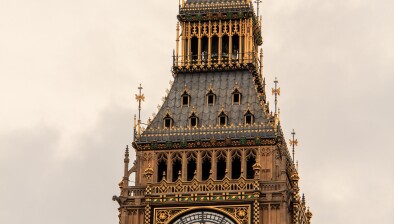Man’s conviction for burgling solicitors’ office quashed on appeal

A man who claimed he was homeless and looking for somewhere to sleep when he was found in a solicitors’ office has had his conviction for burglary and criminal damage quashed by the Court of Appeal.
Robert Kane, 41, had denied the alleged offences at the office of Patrick Morrissey and Co Solicitors, on Crofton Road, Dun Laoghaire, on 3 February 2017.
He was found guilty by a jury at Dublin Circuit Criminal Court and sentenced to three years’ imprisonment with the final six months suspended on 22 June 2017.
However, the Court of Appeal quashed Mr Kane’s conviction yesterday over the trial judge’s instructions to the jury concerning aspects of the defence case.
The prosecution case was that Mr Kane had broken into the premises as a trespasser with a view to committing an offence, most likely theft, while the defence case was that Mr Kane was homeless and was looking for somewhere to sleep.
Giving judgment in the three-judge court, Mr Justice John Edwards said gardaí learned of a possible intruder at the solicitors’ office, which was situated on the second floor of the building, at approximately 8.45pm on the date in question.
On arrival, they could hear noise coming from the solicitors’ office and could see glass on the carpet outside the door of the office, which was an internal door inside the building and which was ajar.
They shouted “gardaí” and entered where they immediately encountered Mr Kane, who was wearing distinctive orange gloves and a dark jacket. The jury were told that Mr Kane was holding a screwdriver and what appeared to be some form of metal rod, but Mr Kane denied this.
One of the gardaí noticed the office appeared to have been ransacked. There were drawers pulled out and papers in disarray.
Mr Kane was arrested and brought to the garda station in Dun Laoghaire, where he initially provided an address but subsequently stated: “No, I’m homeless. Put me down as no fixed abode.”
Counsel for Mr Kane, Kevin White BL, submitted that the trial judge erred in failing to adequately explain the defence case to the jury and undermined it.
Mr White contended that Mr Kane told gardaí at the premises that he was homeless and that he showed them how he got in. Reliance was placed on the fact that nothing was apparently taken during the alleged burglary, the upper floors of the building were vacant, and it was easy to get in.
The defence were anxious for the jury to hear about attempts to interview Mr Kane while he was handcuffed to a chair as a result of becoming violent, as well as the decision to press on with an attempt to interview him without his solicitor present, despite his requests. They said it was indicative of a generally hostile garda attitude towards him.
The prosecution argued that it wasn’t necessary to adduce any evidence concerning the interviews, because no substantive interview had in fact taken place.
Rightly or wrongly, Mr Justice Edwards said, the jury were allowed to hear evidence concerning these aspects of the interview.
The trial judge told the jury that nothing was said during Kane’s garda interviews. He then told the jury that there had been “no interview” and “no admissions”.
Mr Justice Edwards said the Court of Appeal was concerned the trial judge did not confine himself to saying that nothing of evidential value had resulted from the interviews. There was a concern the jury may have been left with the impression that in some way Mr Kane was obliged to, or expected to, make admissions. There was simply no need to emphasise the fact there were no admissions, he added.
He said the Court of Appeal had sympathy for the trial judge because it was the defence who sought to introduce what occurred in the interview room, and the trial judge was endeavouring to be “fair and even-handed”.
He said the issue was a finely balanced one but on balance, the trial judge’s instructions had the potential to mislead or confuse the jury.
Furthermore, Mr Justice Edwards said the trial judge’s failure to allude to a “major plank” of the defence case created an unfairness.
He said the defence laid particular emphasis on the sighting of a man in a khaki jacket passing by the front door of a ground floor premises, before the gardaí arrived. The trial judge’s failure to allude to it was an error that created an unfairness in his summary of the defence case, Mr Justice Edwards said.
It was an evidential basis for inviting the jury to consider whether the prosecution had excluded the possibility that another intruder had broken into the offices on the same evening, before Mr Kane was apprehended, the judge said.
He said the defence did not go into evidence, which was “always going to be difficult to sustain”. He said the defence, for the most part, adopted a strategy of seeking to test the prosecution case.
Mr Justice Edwards, who sat with Mr Justice Patrick McCarthy and Ms Justice Isobel Kennedy, said the court would allow the appeal.
The case was put back to allow the DPP consider whether a retrial will be sought.
Ruaidhrí Giblin, Ireland International News Agency Ltd.









